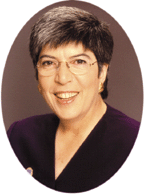The NCAA News - News and Features
The NCAA News -- December 6, 1999
Voice for change
Donna Lopiano has delivered a constant message for the expansion of women's sports opportunities
BY KAY HAWES
STAFF WRITER
 Now the executive director of the Women's Sports Foundation, a post she has held since 1992, Donna Lopiano is a nationally known advocate for women's sports. Now the executive director of the Women's Sports Foundation, a post she has held since 1992, Donna Lopiano is a nationally known advocate for women's sports.
Her path to her current position, ranked No. 67 by The Sporting News on its list of "The 100 Most Influential People in Sports," brought Lopiano through a turbulent time for women's sports and for the NCAA.
As a student-athlete at Southern Connecticut State University, Lopiano played softball, basketball, volleyball and field hockey. All together, Lopiano participated in 26 national championships in four sports. She earned a master's degree and doctorate from the University of Southern California, then began her professional career at Brooklyn College, where she was an assistant athletics director and coach of softball, basketball and volleyball.
She then went to the University of Texas at Austin, where she was the women's athletics director during a tumultuous time in women's sports.
A time of change
In the 1980s, Lopiano filled two different roles, giving her a prominent position in women's athletics. Besides her duties at Texas, she also gained national attention as the last sitting president of the Association for Intercollegiate Athletics for Women (AIAW), the women's sports organization that conducted women's championships and governed women's intercollegiate athletics from 1971 to 1982.
The AIAW, which was governed by women and had a variety of rules differing from those of the NCAA, went out of business when the NCAA started offering women's championships (and paying the transportation costs of championships participants, something the AIAW could not afford to do). Its base of members depleted and its television contract with NBC canceled, the AIAW filed suit against the NCAA, alleging antitrust violations.
The AIAW ultimately lost the lawsuit, and the NCAA became the governing body for women's intercollegiate sports.
In arguing against the NCAA's takeover of women's sports -- an opinion widely held by women athletics administrators of the time -- Lopiano was very critical of the Association, at different points calling it "corruption-laden" and "philosophically and fiscally irresponsible."
Like many of her peers, Lopiano saw the death of the AIAW as the death of women controlling their own championships and their own direction in sport. Lopiano and others also saw the NCAA's interest in women's sports -- right about the time that the AIAW began to make profits -- as less than honorable. They also worried about the welfare of women student-athletes who, they felt, had been protected by many of the AIAW's rules against traditional men's regulations, such as off-campus recruiting.
"When the AIAW was young and growing, no one cared what we did," Lopiano said in January 1981. "The fact is that the AIAW has become too powerful -- as an influence in demonstrating to the public that it is possible to have a highly competitive, highly visible and very successful program and at the same time one in which the student-athlete is protected and off-campus recruiting pressures on coaches and athletes are not necessary."
Lopiano now acknowledges that the AIAW was perhaps fighting a losing battle as soon as the NCAA became interested in women's sports.
"I'm not sure it could have worked out differently," she said. "What happened was really the choice of the more powerful organization."
Lopiano continued to work within the structure and was at the helm at Texas for 18 women's national championships. Her athletics budget grew from $57,000 to $4 million during the time she was there.
She also continued
to voice her opinions
about women's sports, serving on numerous NCAA committees and task forces. She remains disappointed with the Association's progress for women in sport, especially with the lack of women's representation.
"The NCAA minimal promises were real because they were legislated," she said, referring to female representation on NCAA committees and councils. "But women's fears of the minimums becoming maximums have been demonstrated.
"I also think that the NCAA has not done all that it could to promote women's sports. It took 10 years for it to really embrace (women's sports). Over the last five years or so, and even with the hiring of Dick Schultz (who served as executive director from 1987 to 1994), there has been progress. Schultz was extra helpful to women's sports. But in my opinion, waiting another decade was not in anyone's best interests."
In her work for the Women's Sports Foundation, Lopiano continues to address NCAA audiences from time to time. She is hopeful about both the present of women's athletics and its future.
"I think there are a lot of really good things happening in women's sports right now," she said. "But what needed to be done (in the past two decades) was to hold the line on men's sports expenses, not growing them at double the pace of inflation and more," she said.
"The expenditure spiral in men's sports is what's making it difficult to comply with Title IX. (The growth of women's sports) is still going to be a struggle. Unfortunately, there are some dinosaurs out there who are still in the dark ages."
|